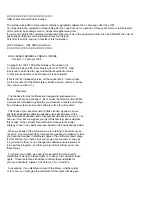
32
Novell eDirectory 8.8 Administration Guide
no
vd
ocx (
E
NU)
01
F
ebr
ua
ry
200
6
• Login Script lets you create specific login commands for a User object. When a user logs in, the
container login script runs first. Then a profile login script runs if the User object has been
added to the membership list of a Profile object. Finally, the user login script runs (if one
exists).
You should put most of the login commands in container login scripts to save administrative
time. The user login script can be edited to manage unique exceptions to common needs.
• Login Time Restrictions lets you set times and days when the user can log in.
• Network Addresses contains system-generated values that list all the IPX
TM
and/or IP addresses
that the user is logged in from. These values are useful for troubleshooting network problems at
the packet level.
• Require a Password lets you control whether the user must use a password. Other related
properties let you set common password constraints such as password length.
• Rights to Files and Directories lists all rights assignments made for this user to the NetWare file
system. Using iManager, you can also check a user’s effective rights to files and directories,
which include those inherited from other objects.
Group
You can create Group objects to help you manage sets of User objects.
What a Group Object Represents
A Group object represents a set of User objects.
Usage
Container objects let you manage all User objects in that container, and Group objects are for
subsets within a container or in multiple containers.
Group objects have two main purposes:
• They allow you to grant rights to a number of User objects at once.
• They allow you to specify login script commands using the
IF MEMBER OF
syntax.
Static Groups
Static groups identify the member objects explicitly. Each member is assigned to the group
explicitly.
These groups provide a static list of members, as well as referential integrity between the members
list of the group and the members of attributes on an object. Group membership is managed
explicitly through the member attribute.
Dynamic Groups
Dynamic groups use an LDAP URL to define a set of rules which, when matched by eDirectory
User objects, define the members of the group. Dynamic group members share a common set of
attributes as defined by the search filter specified in the URL. For more information on the LDAP
URL format, see
RFC 2255 (http://www.cis.ohio-state.edu/cgi-bin/rfc/rfc2255.html)
.
Dynamic groups let you specify the criteria to be used for evaluating membership in a group. The
actual members of the group are dynamically evaluated by eDirectory, which lets you define the
Содержание EDIRECTORY 8.8 - GUIDE
Страница 4: ...novdocx ENU 01 February 2006...
Страница 16: ...16 Novell eDirectory 8 8 Administration Guide novdocx ENU 01 February 2006...
Страница 68: ...68 Novell eDirectory 8 8 Administration Guide novdocx ENU 01 February 2006...
Страница 90: ...90 Novell eDirectory 8 8 Administration Guide novdocx ENU 01 February 2006...
Страница 116: ...116 Novell eDirectory 8 8 Administration Guide novdocx ENU 01 February 2006...
Страница 128: ...128 Novell eDirectory 8 8 Administration Guide novdocx ENU 01 February 2006...
Страница 184: ...184 Novell eDirectory 8 8 Administration Guide novdocx ENU 01 February 2006...
Страница 249: ...250 Novell eDirectory 8 8 Administration Guide novdocx ENU 01 February 2006...
Страница 307: ...308 Novell eDirectory 8 8 Administration Guide novdocx ENU 01 February 2006...
Страница 333: ...334 Novell eDirectory 8 8 Administration Guide novdocx ENU 01 February 2006...
Страница 371: ...372 Novell eDirectory 8 8 Administration Guide novdocx ENU 01 February 2006...
Страница 439: ...440 Novell eDirectory 8 8 Administration Guide novdocx ENU 01 February 2006...
Страница 519: ...520 Novell eDirectory 8 8 Administration Guide novdocx ENU 01 February 2006...
Страница 529: ...530 Novell eDirectory 8 8 Administration Guide novdocx ENU 01 February 2006...
Страница 555: ...556 Novell eDirectory 8 8 Administration Guide novdocx ENU 01 February 2006...
















































